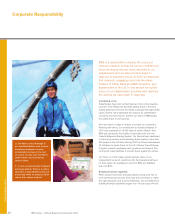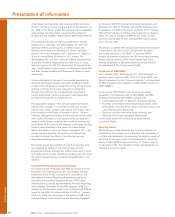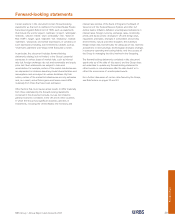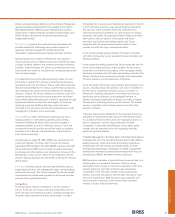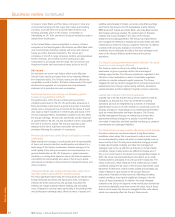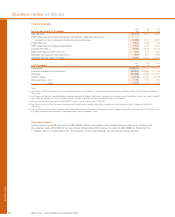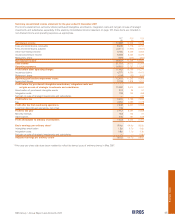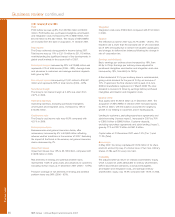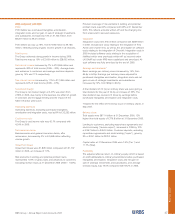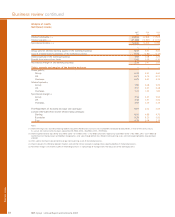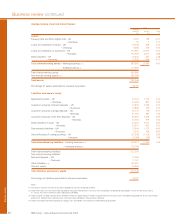RBS 2007 Annual Report Download - page 34
Download and view the complete annual report
Please find page 34 of the 2007 RBS annual report below. You can navigate through the pages in the report by either clicking on the pages listed below, or by using the keyword search tool below to find specific information within the annual report.
RBS Group • Annual Report and Accounts 2007
32
Business review continued
Business review
In Ireland, Ulster Bank and First Active compete in retail and
commercial banking with the major Irish banks and building
societies, and with other UK and international banks and
building societies active in the market. Competition is
intensifying as UK, Irish and other European institutions seek to
expand their businesses.
In the United States, where competition is intense, Citizens
competes in the New England, Mid-Atlantic and Mid West retail
and mid-corporate banking markets with local and regional
banks and other financial institutions. The Group also
competes in the US in large corporate lending and specialised
finance markets, and in fixed-income trading and sales.
Competition is principally with the large US commercial and
investment banks and international banks active in the US.
Risk factors
Set out below are certain risk factors which could affect the
Group’s future results and cause them to be materially different
from expected results. The Group’s results are also affected by
competition and other factors. The factors discussed in this report
should not be regarded as a complete and comprehensive
statement of all potential risks and uncertainties.
The Group's business and earnings are affected by general
business and geopolitical conditions
The performance of the Group is influenced by economic
conditions particularly in the UK, US and Europe. Downturns in
these economies could result in a general reduction in business
activity and a consequent loss of income for the Group. It could
also cause a higher incidence of credit losses and losses in the
Group’s trading portfolios. Geopolitical conditions can also affect
the Groups earnings. Terrorist acts and threats and the response
of governments in the UK, US and elsewhere to them could affect
the level of economic activity. The Group’s business is also
exposed to the risk of business interruption and economic
slowdown following the outbreak of a pandemic.
The financial performance of the Group is affected by borrower
credit quality
Risks arising from changes in credit quality and the recoverability
of loans and amounts due from counterparties are inherent in a
wide range of the Group’s businesses. Adverse changes in the
credit quality of the Group’s borrowers and counterparties or a
general deterioration in UK, US, European or global economic
conditions, or arising from systemic risks in the financial systems,
could affect the recoverability and value of the Group’s assets
and require an increase in the provision for impairment losses and
other provisions.
Changes in interest rates, foreign exchange rates, equity prices
and other market factors affect the Group’s business
The most significant market risks the Group faces are interest rate,
foreign exchange and bond and equity price risks. Changes in
interest rate levels, yield curves and spreads may affect the
interest rate margin realised between lending and borrowing
costs. Changes in currency rates, particularly in the sterling-dollar
and sterling-euro exchange rates, affect the value of assets and
liabilities denominated in foreign currencies and affect earnings
reported by the Group’s non-UK subsidiaries, mainly Citizens,
RBS Greenwich Capital and Ulster Bank, and may affect income
from foreign exchange dealing. The performance of financial
markets may cause changes in the value of the Group’s
investment and trading portfolios. The Group has implemented
risk management methods to mitigate and control these and other
market risks to which the Group is exposed. However, it is difficult
to predict with accuracy changes in economic or market
conditions and to anticipate the effects that such changes could
have on the Group’s financial performance and business
operations.
The Group’s business performance could be affected if its capital
resources are not managed effectively
The Group’s capital is critical to its ability to operate its
businesses, to grow organically and to take advantage of
strategic opportunities. The Group is required by regulators in the
UK and in other jurisdictions in which it undertakes regulated
activities to maintain adequate capital resources. The Group
mitigates the risk by careful management of its balance sheet and
capital resources, through capital raising activities, disciplined
capital allocation and the hedging of capital currency exposures.
Liquidity risk is inherent in the Group’s operations
Liquidity risk is the risk that the Group will be unable to meet its
obligations as they fall due. This risk is inherent in banking
operations and can be heightened by a number of enterprise
specific factors such as an over reliance on a particular source of
funding, changes in credit ratings or by market-wide phenomena
such as market dislocation and major disasters. The Group’s
liquidity management focuses on maintaining a diverse and
appropriate funding strategy for its assets, in controlling the
mis-match of maturities and from carefully monitoring its undrawn
commitments and contingent liabilities.
The Group’s future earnings could be affected by market illiquidity
Financial markets are sometimes subject to significant stress
conditions where steep falls in perceived or actual asset values
are accompanied by severe reduction in market liquidity, such as
recent events in the U.S. sub-prime residential mortgage market.
In dislocated markets, hedging and other risk management
strategies may not be as effective as they are in normal market
conditions. Severe market events are difficult to foresee and, if
they occur, could result in the Group incurring significant losses. In
2007, the Group recorded significant write-downs on its credit
market positions, principally on its US sub-prime exposures. The
Group continues to have exposure to this market and as market
conditions change the fair value of the Group’s instruments could
fall further. Furthermore, recent market volatility and illiquidity has
made it difficult to value certain of the Group’s financial
instruments. Valuations in future periods, reflecting prevailing
market conditions, may result in significant changes in the fair
values of these instruments. In addition, the value ultimately
realised by the Group will depend on the market price at that time
and may be materially lower than current fair value. Any of these
factors could require the Group to recognise further write-downs
which may adversely affect the Group’s future results.


